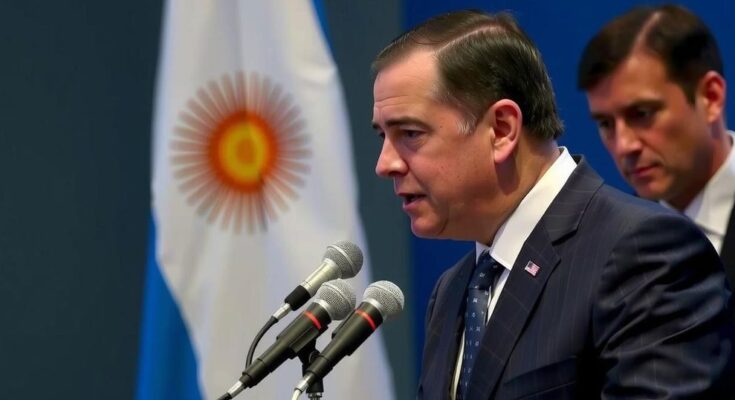Argentina’s President Javier Milei has dismissed Foreign Minister Diana Mondino just hours after the country voted in favor of lifting the U.S. embargo on Cuba at the U.N. General Assembly. This decision reflects a shift in foreign policy under Milei, who has been moving to align Argentina more closely with U.S. and Israeli interests, countering the prevailing sentiments in Latin America.
In a significant political development, Argentina’s President Javier Milei has terminated the appointment of Foreign Minister Diana Mondino shortly after the nation supported a resolution at the United Nations General Assembly advocating for the cessation of the United States’ economic embargo against Cuba. The announcement of Mondino’s replacement was made by Milei’s spokesman, Manuel Adorni, and her successor will be Gerardo Werthein, who currently serves as Argentina’s ambassador to the United States. Although the spokesperson did not provide specific reasons for this abrupt change, it notably coincided with Argentina’s vote in favor of lifting the embargo. On that occasion, 187 countries participated in the UN voting process, with only the United States and Israel opposing the resolution. Since his inauguration in December 2023, President Milei’s administration has marked a departure in Argentine foreign policy, leaning more closely towards the interests of the United States and Israel. Milei has openly declared his support for Israeli Prime Minister Benjamin Netanyahu, especially regarding Israel’s military actions in Gaza, which places him at odds with a multitude of other Latin American leaders. Some nations in the region, such as Bolivia and Colombia, have even severed diplomatic relations with Israel, while several others, including Brazil, have recalled their ambassadors from Tel Aviv.
The recent dismissal of Foreign Minister Diana Mondino highlights tensions in Argentina’s foreign policy direction under President Javier Milei. After assuming office, Milei has attempted to realign Argentina’s international relations to favor the United States and Israel, a marked shift from previous administrations. This realignment includes supporting Israel amidst its controversial military actions in Gaza, which is increasingly unpopular in Latin America. The vote in favor of lifting the U.S. embargo on Cuba at the UN by the Argentine government reflects a contrast between Milei’s professed foreign policy alignment with the U.S. and the broader Latin American stance towards Cuba and Israel, revealing the complexities of foreign relations in the region.
The immediate dismissal of Foreign Minister Diana Mondino following Argentina’s supportive vote to end the U.S. embargo on Cuba suggests a pivotal moment in President Javier Milei’s administration, as he continues to navigate a polarized international landscape. His government’s alignment with the United States and Israel may lead to further diplomatic challenges within Latin America, a region that largely holds differing views on both Cuba and Israel. As Milei’s policies unfold, they will undoubtedly draw scrutiny and provoke responses both domestically and across the continent.
Original Source: abcnews.go.com




